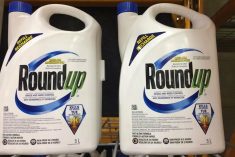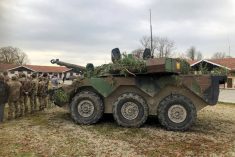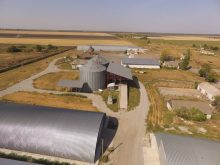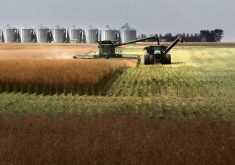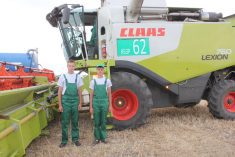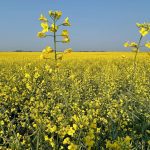The UN’s Food and Agriculture Organization (FAO) has issued a dire warning about the deteriorating state of food security for the people remaining under siege in Ukraine.
Based on an assessment of 19 of 24 oblasts, or regions, the alert issued March 25 speaks to the rising uncertainty about the ability of farmers in that country to harvest winter wheat crops already planted, undertake spring sowing and sustain livestock production.
“An immediate and worrying finding is that food shortages are expected immediately or in the next three months in over 40 per cent of the surveyed areas and cases,” Rein Paulsen, FAO director, Office of Emergencies and Resilience said in a United Nations news release.
Read Also

Trade uncertainty is back on the Canadian national menu
Even if CUSMA-compliant goods remain exempt from Trump’s new tariffs for now, trade risk for farmers has not disappeared, Sylvain Charlebois warns.
But the impact of Putin’s war on Ukraine, which is unusual in that it affects two of the world’s largest exporters of food and feed grains, reaches far beyond its borders.
Just as the pandemic increased global food insecurity by pushing millions of people living just above the poverty line back below it, this conflict is severing food supply chains and driving up costs exponentially.
The Canadian Agricultural Policy Institute (CAPI) pointed out in a report late March that the stakes are even higher. Nothing is more politically destabilizing than the sudden onset of hunger.
“Hunger in less developed countries readily leads to social unrest, bread riots, and revolutions,” the CAPI report says. “The terrible irony is that the food security issues — already in existence but further sparked by the Ukrainian invasion — could spark further secondary conflicts in the Middle East, North Africa, and elsewhere. Thus, there is a need for Canada and others to work with countries where food represents a relatively large share of household incomes to reduce the fallout of the Ukrainian invasion.”
It’s becoming more apparent by the day that this unfolding disaster has joined the global pandemic as defining moments in modern human history. The world is staring at serious grain supply shocks for which there is no easy remedy. The only certainty is that the situation will get much, much worse if Putin wins because it will cause further instability.
The path to increased production elsewhere to make up for what is being lost in Ukraine and withheld by Russia is a long one that is fraught with complications. It takes time to push into production arable land that has been idled (usually because it’s environmentally fragile or not very productive) or lands that are not yet developed.
Fertilizer supplies farmers depend upon to grow those crops are also being affected. In a strange twist, despite Canada’s robust supplies of natural gas used to manufacture fertilizer, it has become dependent on nitrogen imports from Russia.
To that end, the CAPI report suggests Canada needs to invest in both fertilizer self-sufficiency and greater use efficiency to reduce its need for imports. Finding ways to use less manufactured fertilizer is one path to lowering greenhouse gas emissions.
Meanwhile, global carry-over stocks of grain have been shrinking in recent years due to production shortfalls in major growing regions. Further, the stocks that do exist are not necessarily available.
China currently controls about 50 per cent of global wheat stocks and over 70 per cent of global corn stocks.
“It must be assumed that these stocks are held by China for China, and will not be redistributed elsewhere,” the CAPI report says.
In other words, when it comes to a nation protecting its interests, this grain won’t be for sale at any price.
This new era will affect all of us to varying degrees, ranging from those of us inconvenienced by higher food prices to those who will simply go without.
As consumers, we can all help out by remembering that the food that we waste also wastes all the seed, fertilizer, herbicides, labour, transportation, processing and packaging that’s gone into making it, as well as the money we spent buying it.
Instead of throwing it out, consider throwing it into the soup pot or a casserole instead.
Farmers meanwhile, have some bigger choices to make — mainly about what not to do.
It’s a year when prospects for profitability are good for virtually every crop they grow. The attention on global supply shortages is focused on cereals used for food and feed. Early estimates of U.S. seeding intentions point to higher soybean acres at the expense of corn and for no change in the wheat acreage.
In Canada, “between 2019 and 2022 wheat acreage in Canada declined 6.5 per cent while canola acreage increased 8.2 per cent. With prices of both canola and wheat exceptionally high, it is unclear that producers in the west would shift large acreages to wheat and away from canola.”
Farmers’ decisions will be driven by rotational issues, the availability of production inputs and market signals, as they should be.
While it is in their own best interests — and the world’s — to continue to refine their production decisions around efficiency and sustainable use of resources, it would be a mistake to fall back into the mythology that farmers need to pull out all the stops and rip out every last tree row to “feed the world.”
That rhetoric places all the burden on their productivity when, as the current situation exposes, it’s much more complicated than that.
That brings us to the role of government. Domestically, the CAPI report points out that the current situation underscores the need for Canada to invest in supply chain resiliency starting with rail and port infrastructure. That’s a challenge to industry but governments will have a role in facilitating that, just as they can support farmers’ transition to better fertilizer management.
Internationally, Canada needs to up its game — not just as a reliable supplier of food ingredients in a commercial sense but in using food as an instrument of peace. “There is a need for Canada and others to work with countries where food represents a relatively large share of household incomes to reduce the fallout of the Ukrainian invasion,” CAPI says.
In the grand scheme of things, all of these gestures may seem small. But in a world with big problems, never underestimate the power of a lot of little choices.




